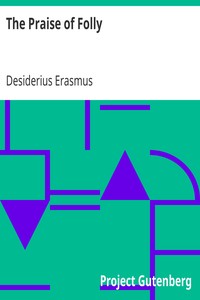| Author |
Erasmus, Desiderius, 1469-1536 |
| Translator |
Wilson, John, 1626-1696 |
| Uniform Title |
Moriae encomium. English
|
| Title |
The Praise of Folly
|
| Note |
Reading ease score: 61.6 (8th & 9th grade). Neither easy nor difficult to read.
|
| Credits |
Produced by Robert Shimmin and PG Distributed Proofreaders.
HTML version by Al Haines
|
| Summary |
"The Praise of Folly" by Desiderius Erasmus is a satirical oration written during the early 16th century. The work is presented as a speech by Folly herself, who seeks to humorously extol her own virtues while critiquing the foolishness inherent in human behavior and society. Through mock-serious tones and witty reflections on the characteristics of folly, Erasmus invites readers to reconsider the value placed on wisdom and seriousness in life. At the start of the text, Erasmus addresses his friend Thomas More, setting a light-hearted and convivial stage for the speech that follows. Folly personifies herself as a deity, claiming her influence over gods and men alike. She playfully argues that her presence brings joy and pleasure to life while highlighting the absurdities and contradictions of human nature, particularly those associated with wisdom, self-importance, and social pretensions. Folly clearly forms her own “household” of figures akin to self-love, pleasure, and laziness, establishing a vibrant tableau that illustrates how her reign impacts relationships and societal norms. Throughout these passages, she makes both light and profound observations, suggesting that embracing folly might lead to a happier and more fulfilled existence than pursuing relentless wisdom and seriousness. (This is an automatically generated summary.)
|
| Language |
English |
| LoC Class |
PA: Language and Literatures: Classical Languages and Literature
|
| Subject |
Folly -- Early works to 1800
|
| Subject |
Folly -- Religious aspects -- Christianity
|
| Category |
Text |
| EBook-No. |
9371 |
| Release Date |
Nov 1, 2005 |
| Most Recently Updated |
Oct 3, 2014 |
| Copyright Status |
Public domain in the USA. |
| Downloads |
542 downloads in the last 30 days. |
|
Project Gutenberg eBooks are always free!
|

